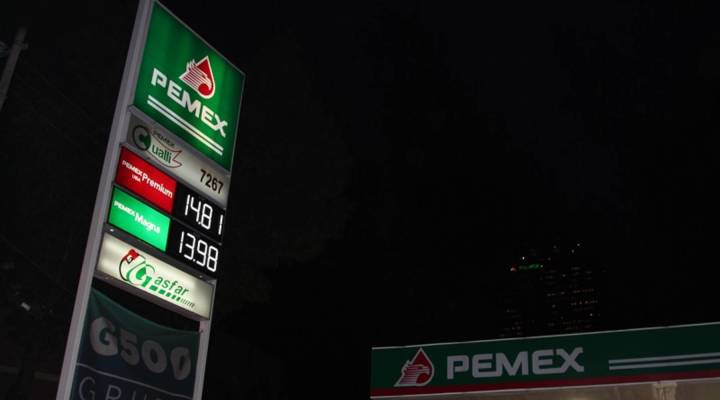
Mexico’s energy reform and Pemex both face challenges

President Donald Trump says he wants to renegotiate the North American Free Trade Agreement with Mexico and Canada. That has a lot of businesses that do cross-border trade concerned, including some U.S. energy executives, even though energy was excluded from NAFTA.
Under Mexico’s nascent energy reform program, American energy companies such as Exxon Mobil, led until recently by Secretary of State Rex Tillerson, are now pitching once-unthinkable exploration and production partnerships with Pemex, Mexico’s state-owned energy agency. It’s all part of Mexico’s attempt to modernize and inject cash into its energy sector. But there may be reform that has to take place at Pemex itself before more U.S. companies invest.
The nerve center of Mexican energy is Torre Ejecutiva Pemex. It is unmistakable on Mexico City’s skyline, a monument to oil and gas when both produced massive, steady income. That is no longer the case. When Mexico ushered in energy reform three years ago, inviting foreign players into the market for the first time since 1938, crude oil sold for $100 a barrel. Today it’s worth about half as much. These days, Pemex is slashing its workforce, dumping pension obligations and selling off non-energy-related assets.
“It’s not easy to see a simple, competitive future for Pemex,” Mexican energy analyst David Shields said. “It is overstaffed, it is over-debted, and it has all kinds of burdens that it has inherited over the years when oil prices were high. And high prices bring inefficiency, overspending.”
Pemex’s finances are messy. The Mexican government keeps slashing its annual $20 billion budget while also using Pemex as a piggy bank, taking away money it does make to build schools, hospitals, and in one case, a baseball stadium. Credit rating agency Moody’s has downgraded Pemex, which will make it harder for Pemex to borrow money, and a Fitch ratings analysis said Pemex faces insolvency.
Pemex needs to cut the fat, said Jorge Piñon, who leads the Latin America and Caribbean Energy Program at the University of Texas at Austin, and who once headed Amoco Oil in Latin America.
“You have to swallow very unsavory medicine in order to take care of the patient’s illness,” he said.
Piñon said Pemex is taking its medicine, slashing jobs and cutting pension obligations. But he said changing corporate culture at Pemex won’t be quick or easy.
“When you have institution like Pemex that for 75 years has been a state monopoly, it is inherently corrupt in the way that it does business.”
Pemex acknowledges that some of its own workers may be stealing oil. It has hired a foreign company to set up surveillance cameras at its pipelines. Pemex said the current gasoline shortage in Mexico, one that’s sparking continuing outrage, is in part caused by oil theft.
Pemex is aware that corruption is an issue.
“It’s a fact. And we need to face it,” said José Manuel Carrera, Pemex’s director of business development.
And there’s something else: brazen nepotism, said Cleantho Leithe, who runs the Mexico office of Brazil’s Braskem, Latin America’s largest petrochemical company. Braskem is one of the early foreign players in the deregulated Mexican energy market.
“When somebody retired,” Leithe explained, “he could indicate that he wanted his son or his nephew or somebody from his family to take his post. That is absurd.”

A petrochemical plant worker in Veracruz finishes his shift. Veracruz is home to Mexico’s largest petrochemical processing plant, operated by Brazil’s Braskem, a major player in Mexico’s energy reform.
Pemex’s Carrera said the company is working with its union to stop that practice, and Leithe said that it’s changing, albeit slowly.
Leithe agreed with Antonio Garza, the former U.S. ambassador to Mexico, who said U.S. energy companies will miss out if they don’t move in. But Garza, who now lives in Mexico City, also said some of those companies may not move until Pemex gets its books in order.
“Does Pemex need to reform? I’d say, ‘You bet.’ And most Mexicans would say, ‘It should’ve been done yesterday,'” he said.
Despite these challenges, U.S. oil, gas and electricity producers have entered Mexico’s deregulated energy markets, ExxonMobil, Chevron, California’s Sempra Energy and New York-based Blackstone among them. Pemex’s José Manuel Carrera said despite the current low-price environment, there is an upside for U.S. energy companies, even if the Trump administration makes it more expensive for those companies to set up shop in Mexico.
“The opportunity is so large that oil companies are discerning enough and understand that the first barrels that will come out of these fields will be not now but in five to seven years. So they should actually be looking at what is their price expectation on that horizon of time rather than actually just looking at the current price,” Carrera said.
Mexico’s energy reserves have symbolized sovereignty and national pride even before foreign companies were kicked out almost 80 years ago. Mismanagement was ignored when oil prices were high. But now, there’s a real urgency to modernize Pemex and bring in foreign capital — and expertise — to rescue it.
There’s a lot happening in the world. Through it all, Marketplace is here for you.
You rely on Marketplace to break down the world’s events and tell you how it affects you in a fact-based, approachable way. We rely on your financial support to keep making that possible.
Your donation today powers the independent journalism that you rely on. For just $5/month, you can help sustain Marketplace so we can keep reporting on the things that matter to you.












